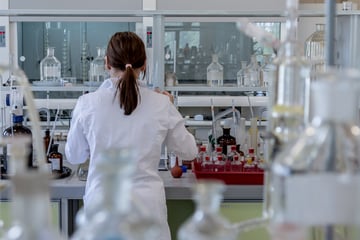Have you ever wondered what kind of jobs you can get with an associate degree in laboratory sciences? The following are two examples of positions that are open to graduates who pursue a degree in this field.
Medical Laboratory Technician
Description: Medical laboratory technicians (MLT) assist physicians in the diagnosis and treatment of diseases by performing tests on blood and other body fluids. Medical lab technicians most commonly work in hospitals or doctors' offices.Salary: $41,420 — $60,520
Job duties: Analyzes body fluids, studies blood samples for use in transfusions, operates laboratory equipment such as microscopes, uses automated equipment and computerized instruments, logs data from medical tests, and discloses test results with physicians.

Public Health
Laboratory Technician
Description: Public Health Laboratory Technicians assist Public Health Microbiologists by performing and initiating routine biological tests. They weigh, prepare, and sterilize culture media and reagents for testing, as well as perform courier services.
Salary: $32,800 — $35,700
Job Duties: Performs courier services, weighs, prepares and sterilizes cultures, assist in autopsying animals, prepares cultures and biochemical setups for microbiologists, assist in application of quality control standard, process and label reagents and solutions, discards test setups after each testing is completed, and assist in training of laboratory personnel.
Where Can I Pursue a Degree in Laboratory Sciences?
Hocking College in Nelsonville, OH offers a Laboratory Science program. In two years, you could graduate with an Associate of Applied Science in Laboratory Sciences.
How Can I Qualify for a MLT Program?
In order to participate in a medical laboratory science educational program, students must be able to comply with program-designated essential functions, or request reasonable accommodations to execute the following functions:
- Demonstrate sound intellect
- Have good organizational skills
- Be an effective problem solver
- Possess good motor skills
- Have good hand-eye coordination
- Demonstrate good dexterity
- Possess a strong set of ethics
- Have effective communication skills
- Have critical thinking skills
- Possess visual acuity to perform macroscopic and microscopic analyses, or read procedures, graphs, etc.
- Be computer literate
- Be able to work independently
- Be able to manage time efficiently
- Be able to comprehend, analyze, and synthesize various materials
- Hold sound psychological health and stability
Where Can I Get More Information on Hocking College's Laboratory Sciences Program?
For more information on Hocking College’s Laboratory Sciences program, contact Medical Lab Technologies Program Manager, Kimberly Ephlin, by email at ephlink@hocking.edu or by phone at (740) 753-6356.



